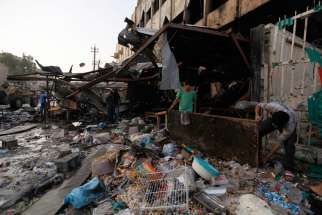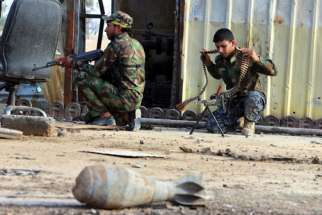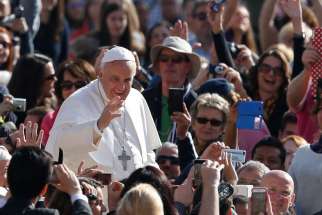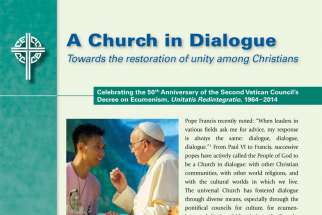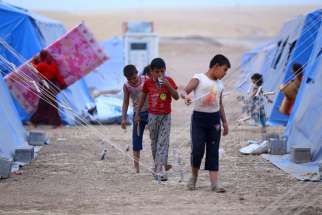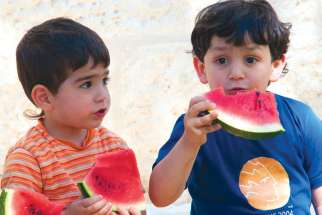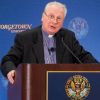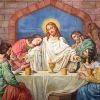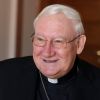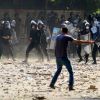Persecution is a 'shared experience' that unites all Christians
VATICAN CITY - The persecution and martyrdom of Christians around the world have become "a shared experience" and a common journey that unites all who give witness to Christ, Pope Francis said.
VATICAN CITY - Pope Francis called on the international community to find a way to bring peace to Iraq and the Middle East and prayed that Christians there would no longer be forced to flee their homes.
Halfway Christians
Canadian bishops mark 50th anniversary of decree on ecumenism
OTTAWA - Canada's Catholic bishops examine the church's connection with other Christian churches in a document marking the 50th anniversary of the Second Vatican Council's decree on ecumenism.
AMMAN, Jordan - The fall of Mosul, Iraq's second-largest city, to Islamist militants in early June sent half a million residents scurrying for safety, but Christians from the city say they were targeted long before Iraqi security forces abandoned the major political and economic hub.
Christians ‘drowning in a sea of Muslims’
BETHLEHEM - The Vatican has been increasingly concerned about the possibility the Middle East will become a kind of Disneyland for Christians, full of interesting Christian history, architecture and archeology that will attract tourists, but virtually empty of Christians.
WASHINGTON - Some of Egypt's Christians feel uncomfortable with Islamists in power, but there is greater freedom of speech than before the revolution, said the Pope's ambassador to the Middle Eastern country.
"I think there is a greater freedom now, though they accuse the present regime of also clamping down on people, on trying to control the press ... so they say that the president is becoming a pharaoh," the Vatican nuncio, Archbishop Michael Fitzgerald, told Catholic News Service.
"Christians are feeling uncomfortable and certainly the Salafi group," an ultraconservative sect of Islam, "is showing ... disrespect for Christians," he said during a mid-October visit to Washington. "There are complaints and, I would say, they are genuine complaints."
The archbishop said that often what begins as a conflict over property or family affairs turns religious and "ends up with people having their houses burned or their shops destroyed or their place of worship also attacked."
"It's easy to arouse a group of Muslims against the Christians, and there can be also a reaction on the Christian side," he said, adding, "The thing is that people are rather hot-tempered and they don't reason very much before they react."
When there is a problem, he said, Christians feel "that the security forces don't come in time, they always come late, and, very often, they hold reconciliation sessions and the Christians are always the losers.
"They would prefer to have people brought to trial and to be condemned ... to have their full rights," he said.
After Egyptian President Hosni Mubarak was ousted in February 2011, an Egyptian military council assumed broad powers. Sixteen months later, Mohammed Morsi of the Islamist Muslim Brotherhood was elected Egypt's new president.
During those 16 months, the Church sponsored seminars and lectures to encourage awareness of parties and issues. Cairo's justice and peace commission also sponsored candidate forums, the archbishop said.
Morsi has finished his first 100 days in office, and critics say he has not kept most of his promises about what he would achieve in that time.
Egyptians also are awaiting a court ruling on whether the assembly drafting the country's new constitution is legal. Members of Parliament chose members of the assembly, and some Egyptians argue that the assembly does not reflect all sectors of society. The court has said it will issue its ruling Oct. 23.
Fitzgerald said these were signs of emerging democracy.
"Certainly people are ready to criticize the president and to say 'Look, you promised many things, and you're not fulfilling your promises,' ” he said, noting that probably would not have happened before the revolution.
He said he is trying to encourage Christians to participate in the new democracy, although some express fear for what the future holds for their children.
"My own message to them has been, look, there is a new spirit of democracy, and you have to build on that. Though the Islamists are in power now, this doesn't mean to say that they will always be in power. This depends on you," he said.
The anxious wedge between Christians and Muslims
Pope Benedict’s XVI visit to Lebanon last month was a proud and privileged moment for Lebanese and other Christians in the region. But as the Pope spoke on behalf of peace, called for Christian unity and addressed the importance of living the interfaith reality in the region, American embassies in the Middle East and other locations around the world were under siege by Muslim crowds.
Muslim anger was aroused by an amateur film made in the United States that depicted the prophet Mohammad in disrespectful ways. Political cartoons in French newspapers quickly picked up the theme, exacerbating an already volatile situation. The issue is very sensitive to all Muslims. Even a respectful image of the prophet is forbidden.
Much of the world was left with sadness at the death of the U.S. ambassador and three colleagues who were killed when the American embassy in Benghazi, Libya, was stormed. Many in the civilized world simply do not understand why some Muslims respond so violently to a film created by a single individual. We’re left to ask: does the punishment poured out upon those embassies equal the offence?
Pope Benedict, standing shoulder to shoulder with leaders of the Christian world, along with various inter-faith leaders and a group of atheists in Assisi, Italy, in October 2011, made the following comment: “We know that terrorism is often religiously motivated and that the specifically religious character of the attacks is proposed as a justification for the reckless cruelty that considers itself entitled to disregard the rules of morality for the sake of the intended good. In this case, religion does not serve peace, but is used as a justification for violence. While we condemn terrorism of the day, it should be acknowledged that history also gives testimony that Christians have used force and violence in a way which today we acknowledge with a measure of shame.”
Most Canadian and Americans, including Canadian and American Muslims, would agree that these outrageous attacks are without justification and must be condemned. But, regrettably, there is a growing sense in the West that Muslims in general are a menace. Incidents such as these contribute another layer of undeserved resentment and suspicion of most Muslims. It is becoming more difficult for the average person in the West to believe the majority of Muslims are law-abiding, God-fearing, neighbourly people who walk the streets of our neighbourhoods and are very much committed to our same values of freedom, peace and family.
The Muslims who act violently represent a tiny percentage of the world’s Muslim population. Muslims are about a quarter of the planet’s population, about 1.6 billion people in total. In 2009, they exceeded the world’s 1.2 billion Roman Catholics (although there are 2.18 billion Christians overall) and over the next 20 years the Muslim population is projected to grow twice as fast as the rest of the world. The tendency is to regard Muslims as being Middle Eastern or south Asian but the reality is that they inhabit every continent and embody many nationalities and cultures.
So it is incumbent upon us, as Christians, to not paint the whole Muslim world with the same brush of suspicion. Islam is one of three world monotheistic religions, joining Christianity and Judaism. In Islam, Jesus is revered as a prophet but not as divine, while Mary is honoured and mentioned more often in the Quran than in the New Testament. Like Christians, Muslims are called to love their neighbour — and most do.
When a Christian or a Muslim dishonour their neighbour, both fail in the faithfulness to which they have been called, and both must undergo a change of heart. What that means in our day-to-day lives is that if a Christian has an opportunity to befriend a Muslim based upon the Golden Rule, they should take that initiative, thus building a better world. And vice-versa.
Together, Christians and Muslims need to address the sobering question of how to overcome the ideological differences that drive such a wide wedge between them. Is the human desire for genuine peace and freedom stronger than acts of violence? Let’s pray that the answer to that question is yes.
(Fr. MacPherson, SA, is Director of Ecumenical and Interfaith Affairs for the Archdiocese of Toronto.)
Christians resigned to media bias
This is a column about what happens (or doesn’t happen) when Canada’s publicly funded broadcaster mocks Jesus Christ on prime time TV and a no-name amateur filmmaker mocks Mohammad on the Internet.
Throughout September, deadly violence erupted in many parts of the world as groups of Muslims attacked American embassies and other installations after a low-budget video, called The Innocence of Muslims and posted on YouTube, depicted the Prophet Mohammad as a fool and a sexual deviant. In Pakistan, at least two six-figure bounties have been offered, one by a current government official and the other by a former one, to be paid upon the death of the filmmaker. The filmmaker himself is currently being held in a Los Angeles detention centre, reportedly for parole violations.
In Pakistan, at least 23 protesters have been killed. There were also deaths in several other Muslim countries. The violence coincided with an attack on the U.S. diplomatic post in Benghazi, Libya, that killed four people, including the U.S. ambassador.
Meanwhile, on Sept. 28 the CBC program This Hour has 22 Minutes broadcast a skit based on Leonardo Da Vinci’s famous painting of the Last Supper. It used the tableau as a backdrop to satirize recent news reports of writings on a papyrus fragment that allude to a wife of Jesus. (The fragment is of disputed origin and there is certainly no agreement among scholars that it refers to Jesus Christ.) In the skit, a woman identified as Jesus’ wife is shown continually disrupting the Last Supper, complaining that Jesus is constantly carousing with the boys and drinking too much wine. In a particularly offensive segment, the familiar words of the consecration (“This is my blood…”) are interrupted when the Jesus figure complains: “Ellen, do you mind, I’m kind of in the middle of something.”
Although both are offensive, the two videos are different in many respects. But perhaps the most striking difference was not the video content itself but in the respective response from Muslims and Christians. In the first case, we saw violence that we would normally expect only in conditions of war or civil uprising; in the second, there were probably a few hundred groans as many people reached for the remote and perhaps a few dozen angry e-mails and phone calls to the CBC.
The Catholic Civil Rights League has tried over the years to lead the way in protesting serious anti-Catholic media portrayals. I am often asked why the typical Catholic response is usually so tame, if one happens at all. Obviously, there is a cultural factor. North American and European Christians live in free-speech societies and in environments where religious differences tend to be accommodated and where religion is downplayed in a secular public atmosphere. This doesn’t make it right to mock religious beliefs as though faith was just another form of entertainment, but it probably does mean that when it happens Christians regard it more as tasteless humour than a serious attack.
More than likely, the people who send e-mails or make phone calls to complain know that change is unlikely. These complaints won’t reverse the ingrained biases of society and the media.
The CBC’s lampoon of the Last Supper was far from its most serious example of anti-faith bias. No one would take the skit seriously. Some of the false impressions created by the CBC and other networks over the years by their slanted coverage of the sex-abuse scandals, or in police dramas where violence at abortion clinics always seems to have a Catholic angle, probably do more to perpetuate anti-Catholic bias.
Perhaps Catholics, and many other Christians, have stopped paying much attention to the media because the bias is rampant or because they believe any harm done falls short of egregious. While some of the worst South Park episodes, such as those involving a bleeding statue of the Virgin Mary or a depiction of Jesus Christ who could not perform miracles, drew sharp responses, including boycotts, most people responded by simply watching something else.
This may well be part of the reason that the media continues to take liberties with Christianity that they wouldn’t dare take with Islam. Christians seem resigned to the insults.
No one wants a world in which violent responses are the norm, but a short e-mail or phone call in protest of anti-religious bias can let producers and advertisers know they’ve lost some audience. As media executives and politicians both attest, it’s an issue if they hear about it, and if they don’t, it isn’t.
(McGarry is executive director of the Catholic Civil Rights League.)
Vatican synod to examine when divided Christians can preach together
VATICAN CITY - The potential power, but also the limits, of an ecumenical proclamation of the Gospel and defense of Gospel values is likely to be a key topic during October's world Synod of Bishops on the new evangelization.
The ecumenical focus will be particularly sharp Oct. 10 when — at the personal invitation of Pope Benedict XVI — Anglican Archbishop Rowan Williams of Canterbury will deliver a major address to synod members.
While popes have long invited other Christians to be "fraternal delegates" and make brief speeches at the synods, Pope Benedict has begun a tradition of inviting important religious leaders to deliver a major address. In 2008, Orthodox Ecumenical Patriarch Bartholomew of Constantinople and Chief Rabbi Shear-Yashuv Cohen of Haifa, Israel, addressed the Synod of Bishops on the Bible. Another rabbi and two Muslim leaders gave speeches at the 2010 special synod on the Middle East.
Bishop Brian Farrell, secretary of the Pontifical Council for Promoting Christian Unity, said the invitations demonstrate the Pope's recognition that the "challenges facing religious belief itself and Church life are common — no Church, no religion is an island — and we need one another and can learn from one another."
In addition, he said, ecumenical and interreligious co-operation shows the world that "we are together in promoting the values of belief and the moral-ethical values that we stand by."
Ecumenical co-operation is crucial when trying to transmit the faith in the modern world and to re-propose Christianity in areas, especially Europe and North America, which had a Christian tradition, but are becoming increasingly secularized.
"The mission that the Lord entrusted to the Apostles, to preach the Gospel to the ends of the Earth, has not been fulfilled — mostly because of divisions among His followers," Farrell said.
The beginnings of the modern ecumenical movement usually are traced to a 1910 conference of missionaries "who had the experience of being seen as preaching against each other instead of preaching Christ," he said. The missionaries recognized the scandal they were causing as they "exported their divisions" to Asia, Africa and other parts of the world.
The missionaries saw "their work being undermined by their own divisions," which they increasingly acknowledged were violations of the will of Jesus that His followers be one, the bishop said.
Meanwhile, among some Catholics in the early 1900s, "there were the beginnings of a spiritual interest in the idea of prayer for Christian unity," he said, but the quantum leap in the Catholic Church's commitment to ecumenism came with the 1962-65 Second Vatican Council.
Farrell said the change in the Church's attitude reflected an "education of the bishops at the council, because most of the bishops came with the kind of theology that considered our Protestant brothers and sisters, and the Orthodox to a certain degree, as just outside the Church."
Through discussions and studies at the council, he said, the bishops gained "a new perspective: We have a common faith in Jesus Christ, we have a common baptism, and this is already a huge element of real communion in the faith."
The ecumenical task, embraced by the Catholic Church, involves prayer and dialogue to move that communion "from imperfect to perfect," he said. Until the process is complete, however, there will be some limits to the possibilities for ecumenical co-operation in evangelization, because Catholics, Orthodox, Anglicans and other mainline Christians aren't just inviting people to profess faith in Jesus Christ, but to live that faith in His body, the Church.
"There is a kind of superficial ecumenism that says, 'it doesn't matter what Church you belong to,'" Farrell said, but the Catholic Church and most of its dialogue partners reject that view.
Because Christians aren't passing on "some Gospel of their own making," but a faith they have received, "sharing one's faith means sharing one's belonging to a particular community that has given me that faith. It means sharing the conviction, in conscience, that the Gospel comes to me in its fullness in this particular community," the bishop said.
The role of the Church and, in fact, the definition of what it means to be fully Church is at the heart of the ongoing, sometimes difficult, theological ecumenical dialogues, he said.
For the Catholic Church, Farrell said, "We can't work for a common minimum denominator; nor can we say, 'let's keep our differences and just accept one another as we are.'
"We have to aim at whatever is required for the fullness of incorporation into Christ and into the one Church He founded. But where is that Church? That is the question that will trouble us until Christian disunity becomes Christian unity: not uniformity, but true, grace-filled communion in faith and Christian living."
Anti-Islam film unsettles Muslims, while making Christians targets
CAIRO - As tear-gas-bearing police battled Egyptians armed with stones in front of Cairo's U.S. Embassy, Rashad was two neighbourhoods away, making sure the few evening customers respected the line at the Mobinil cellphone company where he works.
"Is it all right to defame the Prophet, blessings be upon him?" Rashad, a Muslim, asked a reporter who inquired about the embassy standoff. "No. There are limits to how far people should be allowed to go."
Rashad, who would not give his last name, had not seen the amateur film reportedly defaming the prophet Mohammed that led to protests at the U.S. embassies in Egypt and other countries. But he said he'd heard enough to know that the film was "haram," or sinful, and that protests against it, however violent, were justified.
Such anger over the film that depicted Mohammed as a sex-crazed simpleton has Egypt's Christians — and others in predominantly Muslim countries — worried. They say the film's association with the Christian West makes them possible targets of extremist behaviour.
"What happens outside the country is very dangerous for us because it is perceived to be related to us inside," said Bishop Adel Zaki of Alexandria, Egypt's vicar for Latin-rite Catholics.
The film was released in July but went almost completely unnoticed in the Middle East until a preview of it was translated into Arabic.
In an interview at his Cairo residence, Zaki told Catholic News Service that Egypt's Catholics condemned defamation of other religions, in line with what he called "the Vatican decree which commands respect for those of other faiths." But when products or policies deemed anti-Arab or anti-Muslim surface in the United States and other Western countries, Egypt's Christians, who account for about eight million of the country's more than 82 million people, often feel the brunt, he said.
People in other countries "should keep in mind that there are repercussions for Christians here. The level of fanaticism grows," he said.
Newly elected Egyptian President Mohammed Morsi, a conservative Muslim, has decried the short film, saying "Egyptians reject any kind of insult against our Prophet." But he also called for restraint and protection of the country's "foreign guests" and embassies.
Despite the tension over the film in Cairo and other parts of the Middle East, Fr. Fady Sady, a Coptic Catholic priest, said he did not expect trouble in Egypt's South, where he lives and serves.
"(Muslims) know those who made the film are not from Egypt, so there will be no problems," he said by cellphone from the city of Nagada. But he added that "when anything contentious" like this film appears abroad, Christians in Egypt go on alert.
"Perhaps someone not very educated could use the event to make an operation," he said, referring to attacks on churches that have occurred in the past.
Back in Cairo, Mohammed Abdu, a 22-year-old Muslim taxi driver, said he was angered by reports of the film but even more upset by the protests at the U.S. Embassy. He said he expected they would further damage Egypt's economy, already facing huge challenges due to dramatic losses in tourism and other business since the 2011 overthrow of former President Hosni Mubarak's authoritarian regime.
"Had (the protesters) been quiet and ignored (the film), it would have disappeared, but now it is famous. When people start climbing walls and attacking embassies, the people who made the film get the attention they wanted," said Abdu, who drives a rented cab 12 hours a day to save enough money to get married. He said he projected even less income for the country now and, consequently, fewer people with money to ride cabs like his.
Internationally, religious leaders from across the spectrum were quick to condemn the hate message of the anti-Islam film and the wave of violent attack it provoked. In a Sept. 11 attack, the U.S. ambassador to Libya, three other Americans and several Libyan soldiers were killed in the consulate in Benghazi, Libya.
The next day, the Vatican condemned the attacks, saying there was no justification for such violence.
After protests in Pakistan gathered momentum, Catholic leaders in Faisalabad condemned the film. A Church official said leaders hoped to avoid possible anti-Christian backlash.
Israeli and Palestinian leaders who work with religious institutions as well as heads of local churches issued a joint statement Sept. 15 deploring "those who abuse free speech to offend the religion and religious beliefs and symbols of others." The leaders also condemned "those who use violence in reaction instead of peacefully protesting against such abuse."
Israeli Deputy Foreign Ministry spokesman Paul Hirschson told the Hebrew edition of Ha'aretz daily newspaper that the content of the film was "beneath contempt" and "vile."
Leaders of the Coptic Orthodox archdiocese of North America expressed sympathy to the families of those killed in Libya and emphasized that such violence contradicted "the virtues of love and tolerance by which Christians are governed." They also rejected allegations that the Coptic Orthodox community was involved in producing the film.
Pope calls Middle Eastern Christians to promote peace through service
BEIRUT - Pope Benedict XVI acknowledged the suffering of Christians in the Middle East, reassuring them and urging them to promote peace through religiously inspired service to their societies.
"Your sufferings are not in vain," the pope told a crowd of at least 350,000 at a sweltering outdoor Mass at Beirut's City Center Waterfront Sept. 16. "Remain ever hopeful because of Christ."
In his homily, Pope Benedict commented on the day's reading from the Gospel of St. Mark, in which Jesus foretells his death and resurrection. Jesus is a "Messiah who suffers," the pope said, "a Messiah who serves, and not some triumphant political savior."
Speaking in a region riven by sectarian politics, where party loyalties are often determined by religious affiliation, the pope warned that people can invoke Jesus to "advance agendas which are not his, to raise false temporal hopes in his regard."
Pope Benedict told his listeners, whose travails of war and economic insecurity he had acknowledged repeatedly throughout his visit, that Christianity is essentially a faith of redemptive suffering.
"Following Jesus means taking up one's cross and following in his footsteps along a difficult path which leads not to earthly power or glory but, if necessary, to self-abandonment, to losing one's life for Christ and the Gospel in order to save it," he said.
Yet Pope Benedict also cited another of the day's Mass readings, the epistle of St. James, to emphasize the spiritual value of "concrete actions" and works, concluding that "service is a fundamental element" of Christian identity.
Addressing a region where Christian-run social services, including schools and health care facilities, are extensively used by the Muslim majority, the pope stressed the importance of "serving the poor, the outcast and the suffering," and called on Christians to be "servants of peace and reconciliation in the Middle East."
"This is an essential testimony which Christians must render here, in cooperation with all people of good will," Pope Benedict said.
During the homily, the only sound was the pope's voice and its echo from the loudspeakers. Many people leaned over and bowed their heads with eyes closed, so they could concentrate more deeply.
Following the Mass, the pope formally presented patriarchs and bishops of the Middle East with a document of his reflections on the 2010 special Synod of Bishops, which was dedicated to the region's Christians. In the 90-page document, called an apostolic exhortation, the pope called for religious freedom and warned of the dangers of fundamentalism.
Sheltered from the sun only by white baseball caps and the occasional umbrella, people had already packed the city's central district by 8 a.m., almost an hour-and-a-half before the pope arrived in the popemobile, which took him to the foot of the altar. In temperatures that rose into the high 80s, the pope celebrated Mass under a canopy while bishops and patriarchs on either side wiped their brows and fanned themselves with programs.
Aside from the complimentary white pope caps, people in the crowd improvised versions of sun protection with torn pieces of corrugated boxes tied around heads and papal and Lebanese flags worn as bandanas.
George Srour, 38, estimated that 20,000 people came from Zahle in a convoy of chartered school buses, leaving at 5 a.m. for the 10 a.m. Mass.
"We Christians must be united and participate" in the pope's visit, Srour told Catholic News Service, "otherwise there will be no more Lebanon. It will become like Iraq, and now Syria, with all the Christians leaving."
- - -
Contributing to this story was Doreen Abi Raad.


